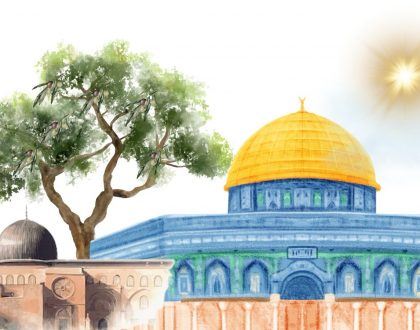Kindness
by Ayesha Khan
If I got you all to stand up and line up in order of height, would that be straightforward? Yes, it wouldn’t take too long, we would just get everyone to rearrange themselves and we would have a line.
If I asked you to line up in order of your intelligence, it would also be possible to average your scores from your exams or do an IQ test and we could line you up in that order.
What if I asked you to line in order of who is the kindest person here?
How would we know that? Is kindness as clear and tangible as someone’s height or grades?
How would we measure that? Is it possible to measure that?
Muslims believe that there is a constant record being kept of all our thoughts and actions. A book in which our entire life is being jotted down in minute detail.
Every single thing we do during the day has either a positive or a negative value. And this can be added up, weighed and measured. Thus we can have a score that represents how good we have been up until now.
So take a minute to reflect on this.
We are so used to keeping track of tangible things, like your possessions which you are carting around all day, information you need to recall for your exams, messages on our phones and things we have to remember to do. When, in all of this, have we had a chance to ponder on how nice we were this morning when we left home?
If we could see our books right now, do we have any idea what our current score would be?
Have you ever reflected on what your ‘kindness value’ per day is? Or how many kind things you did during the day, or past week, or year?
This might be a novel idea for some of you. Frequently we are reacting to things people have said about us, either to us or to other people. We have an ongoing dialogue in our heads justifying the things we did when others around us don’t seem to get it.
But what if we stopped thinking about what others said and just focused on what we did. How many acts of kindness can you recall doing since yesterday?
If I asked you to write them down, would you be struggling to recall them, or would you be filling up a page with them?
It might even be the case, that some of the things we did, we would rather not remember. It might make us uncomfortable to think about it.
So even if we have shifted something uncomfortable that we did into a deep recess of our mind, or relegated it as unimportant because it happened so long ago, for Muslims it is a reality that we will eventually see our lives in black and white and things we wished were buried deep in the past, will not have disappeared, but will be presented back to us.
And good deeds, such as acts of kindness will be tangible and measurable.
So while, it might have seemed that kindness was invisible when I asked if you could line up in kindness order, kindness is not like a footprint in the sand, it’s more of an indelible mark engraved and carved and imprinted on the people around us.
Kindness is tangible.
Kindness has to have a recipient.
And the people around us are the ones who experience how kind or unkind we are.
Maya Angelou said, ‘I’ve learned that people will forget what you said, people will forget what you did, but people will never forget how you made them feel.’
All around us, our family, friends, and people we deal with on a daily basis, are left with either vibes we gave out, or the things we said to them and about them, as well as what we did for them.
That means that everything we do and say matters.
Regardless of how clever we are, or cool, and no matter what set of friends we hang out there is one quality which is evident to people around us and can be perceived quite quickly.
That is how kind we are.
In Islam this is perhaps the most important quality that we should have.
So much so, that it should underpin all our interactions.
In the Quran, God asks us to be kind, merciful and compassionate. And particularly in times when kindness wouldn’t be our automatic response, for example a couple going through a divorce may feel so much bitterness, that acting with kindness towards each other might be the last things on their mind.
God says, ‘The reward of goodness is nothing but goodness’. [55:61]
In another verse, He says the righteous are, ‘Those who spend in good times and bad, and those who suppress anger and pardon men.’ [3:134]
Two of the qualities He uses to describe Himself are the words ‘merciful’ and ‘compassionate’. All Muslims sitting here will be familiar with them because of the number of times they appear in the Quran In Arabic they are ‘Ar Rahman and Ar Raheem’.
God says ‘I am ar-Rahmaan (merciful) and I created the Rahm (womb) and derived its name from My Name. In other words, He is emphasising the connection between His name and the word for womb.
In a culture that is male dominated, it’s quite remarkable that God would make any connection between himself and a woman’s womb.
Yet a mother’s womb beautifully exemplifies mercy. It is a source of protection. A place where one grows and develops and is nurtured in an unparalleled way.
No one can match a mother’s love… except, of course, God. Imagine the emotions of a mother desperately searching for a lost child – and how overjoyed she would feel finding her child again. The Prophet* once asked his companions, “Can you imagine a woman throwing her baby into fire?” When his companions responded in disbelief, he taught them that God has more rahmah (compassion) for His servants than a mother for her child. In other words, He meant that God loves people more than a mother loves her own baby.
He also said that, ‘God divided mercy into one hundred parts. He kept ninety-nine parts and sent down one part to earth. Because of that one single part, creatures are merciful to one another so that even the mare will lift its hooves away from its foal so that it does not trample on it.’ [Muslim]
Coming back to us, we have a choice to be known as someone who is kind, or someone who is only concerned about themselves.
Even if we our main concern is ourselves, kindness is in our actually own interests:
There was a farmer who grew excellent quality corn. Every year he won an award for the best grown corn. One year a newspaper reported interviewed him and discovered that he shared his seed corn with his neighbours. The reporter was surprised. He said why do you share your corn with your neighbours when they are competitors? He replied the wind picks up pollen from the ripening corn and swirls from field to field. If my neighbours grow inferior corn, cross pollination will degrade the quality of my corn. If I am to grow good corn, I must help my neighbours grow good corn.
The type of person Muslims aspire to being is like the Prophet* who showed genuine kindness and concern for others.
Like him, we can wish well for others. And that fills the air and changes the atmosphere.
Kindness is something that God put inside us; it is innate, but can get buried by other negative emotions. So it is something that we need cultivate within ourselves consciously.
By being kind you will find others will reciprocate. People respond to kindness. It has a ripple effect.
This is an Islamic ‘how to’ guide to kindness
Find the good
One way is by looking for the good in others, because no matter how beautiful or intelligent we might be, there is always something in others that we can learn from and aspire to having.
Excuse the bad
If we want others to excuse us when we make mistakes, we need to be able to excuse them when they fall short of our expectations. We are not perfect so it’s not realistic to expect others to be perfect.
In Islam we have a saying which is ‘make 70 excuses for your brother’ which means that if someone fell short of what we expected from them, we step into their shoes, to try to see the situation from other possible angles and perspectives. We recognize that we should not be judgmental of others. That we forgive and move on and that we conceal their faults from others. 70 is just a number in Arabic, which would be like saying 1000 for us. But in fact, if you can’t think of seventy, even if you find a few, you will find that the negative thoughts and feelings have already vanished.
Here are some things that would take the hurt out of being let down.
It was a misunderstanding.
She didn’t hear me.
He tried.
She didn’t have time.
He had no other choice.
She didn’t mean it.
He’s upset about something else.
It was an accident.
He’s having problems at work.
Don’t bitch about others
The worst form of unkindness is talking about people behind their backs.
Be the first
Sometimes we get into a vicious cycle where one person has been unkind, and we respond back with the same. But it takes on of the two to break the cycle and we can be the one to do it.
So being kind, creates a kind environment. The space we inhabit doesn’t exist in spite of us but we contribute to it. This means that if you want to change the way others treat you can’t change the way they are but if you change the way you chances are that they might respond to that If you want your children to be kind and considerate then you would need to show them.
Show don’t tell
If I want my toddlers to say thank you, I have found that no matter how many times I say to them ‘say thank you’ they just stare back at me adamantly refusing to say it. But if I say thank you to them every time they hand me something, they automatically repeat it when I hand it back.
Don’t rub your superiority in someone’s face
The Prophet Muhammad* had two grandsons called Hasan and Husain. Once they were washing themselves before prayer and noticed that an old man was not washing in the proper manner. They went away to discuss this and decided that to tell him he wasn’t doing it right would make him feel embarrassed, so they returned and asked him to tell them which of them was doing it right. That way, the man came to realise he was doing it wrong without having the children point out that they were better than him.
Be kind to all
Often we are unkindest to the people who are closest to us. We may be perfectly polite to strangers only to return home and be rude to our parents or brothers and sisters. So we can take our family for granted and be short tempered with them. But if we don’t change how we are with them, then we can carry resentments with us into the future. If you want to have the kind of relationships with your siblings where they are there for you when you are older, than now is the time to treat them with kindness.
Be genuine
If you wish well for others you will automatically be kinder to them
Remain kind even when you don’t want to
It’s easier to be kind to your friends than the people who irritate you, whether they are in your class or even in your family. But our Prophet* extended his kindness to the people who were nasty to him and many of them converted to Islam as a result.
Don’t be deceived by your ego
Our egos are quite wily. They are very good at telling us that we are nicer than we might be. That there is a justification for how we behaved. That others are frequently wrong, but that if they could only be reasonable they would know that they were in the wrong and that quite frankly we have been right all along.
So I started by asking you your kindness score, so I want to leave you thinking this,
If there was one quality you would choose to describe yourself, what quality would it be?
If people describe to you to someone else what qualities would they say about you?
Are you the person who reaches out to other people, or are you the person who is irritated by other finds fault?
Whether it is a hug, a kind word, or just listening to someone, kindness can transform their day and though it might not have required a lot of effort on your part, it might have meant a huge amount to them.
Aim to have a heart that seeks only good for others; has sincere concern for them and is true to them; offers good counsel; and has a good opinion of all of them.
*peace be upon him
Written by Ayesha Khan in 2015
Recommended Posts

Masjid al Aqsa – why it has a very special place in our hearts
November 29, 2023

Palestine: The Holy Land
November 23, 2023

